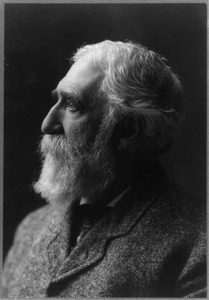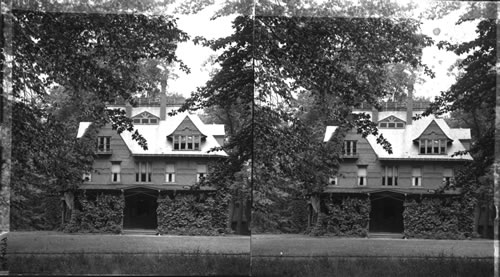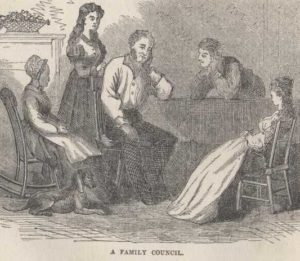By Emily Clark
Like its sister states in New England, Connecticut is known for its many writers: the humorous essayists, the historical novelists, and the prize-winning journalists. Though not as renowned as his peers in the literary circuit of the late 19th century, author Charles Dudley Warner nevertheless penned significant volumes of work, leaving an impact through his enduring social commentary.
Charles Dudley Warner Makes His Way To Hartford
Born in the small town of Plainfield, Massachusetts in 1829, Warner grew up on a relative’s farm in nearby Charlemont after the death of his father and learned to appreciate the natural environment, an idea to which he often alluded in his writing. After graduating from Hamilton College, working in real estate, and earning a law degree, Warner traveled throughout the country before settling in Hartford. Following two unprofitable years practicing law, he returned to what he always loved – writing.

Charles Dudley Warner, 1829-1900, bust portrait, facing left – Library of Congress, Prints and Photographs Division
Warner’s career began when he accepted his friend Joseph Hawley’s offer of assistant editor at The Evening Press in 1860, contributing light, folksy essays to lift readers’ moods during the trying years of the Civil War. Once this newspaper merged with The Hartford Courant seven years later, he and Hawley became co-editors. Even in this position, Warner continued writing. His series of editorials about enjoying nature were printed as a collection entitled My Summer in a Garden. Appreciated for their charm, wit, and devotion to the outdoors, this anthology eventually became a bestseller and established Warner as one of the country’s most popular writers by the early 1870s.
In addition to his journalistic work, Warner also published a number of travel books, including Saunterings, In the Levant, and On Horseback: A Tour of Virginia, North Carolina, and Tennessee, born from his own love of travel. As a successful literary critic, his essays appeared in periodicals such as The Atlantic Monthly, Harper’s, and Scribner’s, and he lectured frequently on various movements, including prison reform, aimed at benefiting the common good. Being a Boy, his memoir of growing up in western Massachusetts, delighted readers with chapters including “The Grindstone of Life” and “The Season of Pumpkin-pie.”
Life at Nook Farm
While living at Nook Farm, a writer’s colony he helped establish on Farmington Avenue in Hartford, Warner and his wife Susan welcomed visitors to their home and became known for their kindness in the community. They surrounded themselves with other prolific writers of the time, including neighbors Harriet Beecher Stowe and Mark Twain. In this post-Civil War era of heated religious and reform movements, Warner chose to entertain readers with his usual commentary on nature, home comforts, and reminiscence. After hearing Twain and Warner complain about the lack of substance in contemporary literature, their wives challenged them to write something better. The two men accepted, and the result of that collaboration in 1873 brought Warner his greatest fame.
The Gilded Age: A Tale of Today, a novel ridiculing the greed, corruption, and commercialism of American society at the time, was a shift from Warner’s typical style though it did highlight his and Twain’s characteristic humor. With the first 11 chapters written by Twain, the next 12 by Warner, and the additional 40 co-authored by both, this literary work of parallel story lines narrates a tale of politics, society, and wealth in Washington, D.C. This satirical piece became equated with the last decades of the 19th century, which is often referred to as the Gilded Age. The novel’s title came from a line of Shakespeare’s King John, in which the nobleman Salisbury says, “To gild refined gold, to paint the lily… is wasteful and ridiculous excess” (Act IV, scene 2). To apply gold over gold, the play implies, is lavish and extreme, characteristics of the period in Twain and Warner’s book, one which sustains as an important social commentary.
Warner is also remembered for various quips, including the famous “Everybody complains about the weather, but nobody does anything about it” (often misattributed to Twain) and “Politics makes strange bedfellows” from his well-known My Summer in a Garden. His humor and nostalgia in an era of societal change gave Warner his signature style. Nook Farm historian Kenneth R. Andrews critiqued this writer’s legacy, saying, “The tenor of all his serious work was in a sense not only a summons, but a recall to the good life – as if that life had once been a reality in the earlier days of the nation.”
Charles Dudley Warner died on October 20, 1900, after collapsing during an afternoon walk in his Hartford neighborhood and is buried at Cedar Hill Cemetery. Friend and co-author Mark Twain served as a pallbearer at his funeral.
Emily Clark is a freelance writer and an English and Journalism teacher at Amity Regional High School in Woodbridge.










